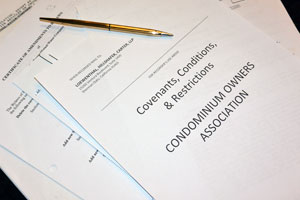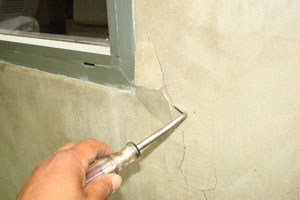LHC Newsletter Vol. 15, No. 1
Contact us Toll-Free: 1-866-474-5529 (info@lhclawyers.net)
By: David A. Loewenthal, Esq.
Robert D. Hillshafer, Esq.
Barbara A. Higgins, Esq.
2023 Year-End Review of California Legislation and Cases which affect
Homeowners’ Associations and Common Interest Developments
NEW LAWS EFFECTIVE JANUARY 1, 2024
AB 1458. Association Governance: Member Election.
[Status: Approved by Governor and Chaptered by the Secretary of State on 10/04/23.]
When an Association cannot achieve the quorum required in its governing documents for a Board of Directors election meeting, this new law allows the Association to adjourn the meeting to a date at least 20 days after the adjourned meeting, and provides that only 20% of the voting members need be present at subsequent meetings in person, by proxy, or by secret written ballot received. If an even lower quorum than 20% is authorized by the governing documents, then the lower reduced quorum prevails. This law requires the Association to provide general notice of the membership meeting at least 30 days before the ballots are distributed containing various specifics, including but not limited to, a statement that the Board of Directors may call a subsequent meeting at least 20 days after a scheduled election if the required quorum is not reached. This reduced quorum allowance does not apply in the case of a special meeting to remove directors.
[AB 1458 amends Section 5115 of the Civil Code, and Section 7512 of the Corporations Code, relating to common interest developments.]
AB 648. Meetings by Teleconference.
[Status: Approved by Governor and Chaptered by the Secretary of State 09/22/23.]
This bill authorizes a meeting of the members (or board meeting) to be conducted entirely by teleconference virtually without requiring a physical location as long as specified conditions are satisfied. These conditions would include, among others, a requirement that the notice for the meeting provide clear instructions on how to participate by teleconference and would require each director and member to have the same ability to participate that would exist if the meeting were held in person. These teleconference provisions would not apply to a meeting at which ballots are counted and tabulated. If ballots are counted the Association must identify a physical location in the Notice of Meeting.
[AB 648 amends Civil Code Section 4090 and adds Section 4926 to the Civil Code.]
AB 572. Assessment Limitation for Affordable Housing Units
[Status: Approved by Governor and Chaptered by the Secretary of State 10/11/23.]
This bill, with certain exceptions, prohibits an Association that records its original CC&Rs on or after January 1, 2025, from imposing an increase of a regular assessment on the owner of a deed-restricted affordable housing unit of more than 5% plus the percentage change in the cost of living, not to exceed 10% greater than the preceding regular assessment for the association’s preceding fiscal year. This bill is significant because it shifts the financial burden to other non-applicable unit owners within the Association disproportionately from the standpoint of equally shared costs for maintenance expenses in the community.
[AB 572 amends Section 5605 of the Civil Code.]
AB 1033. Accessory Dwelling Units: Local Ordinances: Separate Sale or Conveyance
[Status: Approved by Governor and Chaptered by the Secretary of State 10/11/23.]
Cities and local agencies in California are now authorized to adopt a local ordinance which allows a homeowner to sell their Accessory Dwelling Unit (“ADU”) apart from the main unit as a separate condominium unit, and treat it as separate condominium interest property, subject to its own taxes and assessments. However a homeowner in prohibited from selling the ADU without prior written consent of the Association. This could be via Board consent and, if the governing documents require, a membership vote.
[AB 1033 amends Sections 65852.2 and 65852.26 of the Government Code.]
AB 976. Accessory Dwelling Units (“ADUs”)
[Status: Approved by Governor and Chaptered by the Secretary of State 10/11/23.]
This bill prohibits a local agency from imposing an owner-occupancy requirement on any accessory dwelling unit (ADU). However, the municipality can require rentals be no less than 30 days, thus preventing short term rentals.
[AB 976 amends Section 65852.2 of the Government Code.]
AB 1572. Potable Water and Common Areas
[Status: Approved by Governor and Chaptered by the Secretary of State 10/13/23.]
This bill prohibits the use of potable water, as defined, for the irrigation of nonfunctional turf located on commercial, industrial, and institutional properties, other than a cemetery, and on properties of homeowners’ associations, common interest developments, and community service organizations or similar entities, as specified. “Functional turf” means a ground cover surface of turf located in a recreational use area or community space. Turf enclosed by fencing or other barriers to permanently preclude human access for recreation or assembly is not functional turf. The use of potable water shall be prohibited on “all common areas of properties of homeowners’ associations, common interest developments, and community service organizations or similar entities, beginning January 1, 2029”. Potable water” means water that is suitable for human consumption. (Emphasis added.)
[AB amends Sections 10540, 10608.12, and 10608.22 of, to add Section 110 to, and to add Chapter 2.5 (commencing with Section 10608.14) to Part 2.55 of Division 6 of, the Water Code.]
AB 1764. Election Disqualifications for Directors and Nominees.
[Status: Approved by Governor and Chaptered by the Secretary of State 10/11/23.]
AB 1764 is significant because it holds current directors to the same disqualification standards as those nominated for elections. The bill requires that an Association which disqualifies a nominee pursuant to the certain described provisions (including the mandatory disqualification that the candidate must be a member of the Association at the time of nomination) also applies to a sitting Director.
The new statues requires Associations to also disqualify a nominee for the Board if that person has served the maximum number of terms or sequential terms allowed by that Association, even if there are not enough nominees to fill the vacant positions. Discretionary disqualification also apply if part of the Association’s Election Rules. Discretionary Disqualification includes criminal conviction impacting Association fidelity bond, unit ownership of less than one year, delinquent in payment of assessments unless paid under protest or owner has entered into a payment plan, joint ownership in the unit.
[AB 1764 amends Sections 5103, and 5105 of the Civil Code, as related to common interest developments.]
SB 71. Small Claims and Limited Jurisdiction Increases
[Status: Approved by Governor and Chaptered by the Secretary of State 10/13/23.]
This bill increases the small claims court jurisdiction over actions brought by a natural person to an amount does not exceed $12,500, instead of $10,000, except as otherwise specified. The bill also increases the limit on the amount in controversy for an action or special proceeding to be treated as a limited civil case to $35,000 from $25,000.
[SB 71 amends Sections 85 and 86 of the Code of Civil Procedure.]
Corporate Transparency Act (“CTA”)
[Status: Passed and enacted by Congress in 2021. Effective January 1, 2024.]
The objective behind this Act is to help detect, deter, and prevent bad actors and criminal types from using companies and certain business entities to conduct suspicious and illegal activities relating to money laundering and the financing of terrorism. Enforced by the Financial Crimes Enforcement Network (“FINCEN”), the law applies to corporations that have less than $5 million in assets, fewer than 20 employees, and are not subject to broad exemptions such as insurance companies, public utilities, banks, credit unions, etc. While not expressly identified in the Act, unless the above exceptions apply, community associations and management companies will be required to file “Beneficial Ownership Information” (“BOI”) with FINCEN on an annual basis. Such information consists of providing the business name, the legal name, birthdate, home address, driver’s license or passport numbers of Association board members and those individuals in substantial control. The filing for 2024 [for existing state registered entities] must be completed by January 21, 2025, so within one year. For reporting companies formed or registered on or after January 1, 2024, the BOI must be filed within 30 days. Noncompliance could result in civil penalties of $500 per day and criminal penalties of up to $10,000 and up to 24 months in prison (for willful violations). It remains to be seen whether community associations will be exempted from complying with the Act and BOI reporting requirements.
2023 PENDING FEDERAL LEGISLATION OF INTEREST (NOT YET LAW)
This is relevant legislation currently in process of which to be aware, but not yet passed by Congress.
H.R. 4465. Making Condos Safer and Affordable Act of 2023
[Status: Referred to Committee on Financial Services on July 3, 2023.]
This is a new bill “to amend the National Housing Act to authorize insurance of certain mortgages to finance repairs and improvements to condominium projects among other purposes.” (Similar, related bills have previously been proposed, and this is the latest one.) This bill was first introduced on June 24, 2023, in commemoration of the second anniversary of the Champlain Towers South partial condominium collapse in Surfside, Florida. The primary focus is to facilitate funding for repairs and replacements of common facilities within condominium projects where the Association becomes the borrower. This would encompass financing for rehab, alteration, repair, improvement, or replacement costs affiliated with any common system, infrastructure, facilities, features, portions or areas of a condominium project. The maximum principal obligation is capped at 90 percent of projected repair or replacement costs. Part of the bill also concentrates on providing loan products to qualifying homeowners who would be the borrowing to finance the costs of special assessments imposed for repair or replacement of common areas, systems, facilities, infrastructure, features, and other areas.
H.R. 8304. Rapid Financing for Critical Condo Repairs Act of 2022
[Status: Introduced on July 7, 2022, and referred to Committee on Financial Services.]
This is a bill “to authorize the Secretary of Housing and Urban Development to insure loans made to condominium associations to finance repair or replacement of common areas, systems, and features, and for other purposes.” The FHA-insured loans would offer Associations 30 year financing, reducing the need for large special assessments on homeowners.
H.R. 3777. Disaster Assistance Fairness Act
[Status: Introduced on May 31, 2023, and referred to the Committee on Transportation and Infrastructure.]
This Act was introduced “to amend the Robert T. Stafford Disaster Relief and Emergency Assistance Act to provide assistance for common interest communities, condominiums, and housing cooperatives damaged by a major disaster, and for other purposes”. Of note, it makes essential common area elements such as a roof, exterior wall, HVAC equipment, plumbing, stairway, and utilities, eligible for financial assistance under FEMA’s Federal Assistance to Individuals and Households Program. In addition, all homeowner associations would be eligible under FEMA for removal of debris following a major disaster.
2023 UPDATE ON NEW FANNIE MAE/FREDDIE MAC CONDOMINIUM GUIDELINES [Effective September 18, 2023]
After the collapse of the Champlain Towers South Condominium in Surfside, Florida, in 2021, government backed mortgage lenders, Fannie Mae and Freddie Mac, issued temporary project review requirements relating to significant deferred maintenance in condominiums, co-ops, and similar developments.
Fannie Mae and Freddie Mac have both updated and relaxed their requirements for lenders to issue loans to prospective buyers of condominium units at the direction of the Federal Housing Finance Agency (FHFA)
The new requirements apply to all condominium loans and all loans in a co-op project with five or more attached units, as well as those under the waiver of project review. While there may be fewer ineligible projects under the new guidelines, many lenders will have greater concerns about older condominium projects, or those which may be unable to finance necessary upgrades in the future.
The Bulletins define “critical repairs”, “routine repairs”, “material deficiencies”, and “significant deferred maintenance”. See the Fannie Mae Selling Guide Announcement (SEL-2023-06) and Freddie Mac Selling Guide Bulletin 2023-15 designed with the purpose in mind to create permanent guidelines for lenders servicing condominium units.
For Condominium Associations, it is important to note that (1) lenders are now required to review all structural and mechanical inspection reports, including reserve studies, completed in the prior three years from the loan project review, and (2) lenders are now prohibited from issuing loans for complexes with unfunded repairs totaling $10,000 or more per unit. In addition, lenders will likely continue requesting more and more documentation when assessing eligibility. This could include board meeting minutes, meeting notices, budgets, financial reports, reserve studies, building inspection reports, insurance, special assessments, litigation, and other documents related to a Condominium Association’s plans for financing and completing future repairs. Consequently, Associations should keep in mind that certain financial or budgeting practices related to maintenance of the condominium may impact the eligibility of individual condominium units.
These latest bulletins went into effect on September 18, 2023, for all new loan applications. The bulletins were designed to help clarify what is expected for answers on Form 1076.


